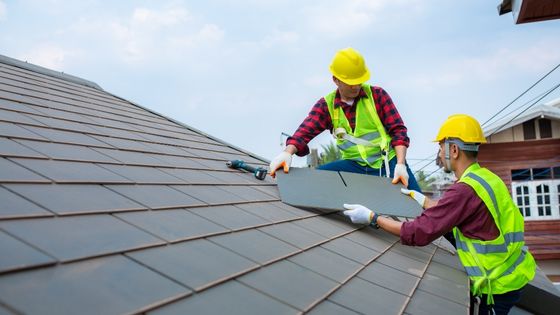Something that a lot of people do not understand unless they have specific knowledge and training is that not every type of roof is created the same. This means that different types of roofs require different types of construction, upkeep, and maintenance. It’s not exactly obvious by just looking at random roofs, but the way that a residential roof is built and maintained is a lot different from a commercial roof. Commercial roofs are typically those flat-style roofs found on buildings, whereas residential roofs are generally those pitched roofs found on people’s homes. Here are a few key differences to know about the two types of roofs.


The Slope of the Roof
A roof’s slope is a lot different depending on the type. For instance, the two main reasons that a residential roof has a steeper slope are to (1) drive the precipitation down into the gutters to clear the roof, and (2) mainly for curb appeal, so the roof looks more attractive to potential buyers. With a commercial roof, the slope is so slight that it’s not even really noticeable, giving it a flat appearance. There is enough of a slope here to enable drainage, but the flatness of the roof also has utility. With commercial roofs, a lot of them are going to hold HVAC systems, generators, various panels, access ports, etc. So a commercial roof is created to be functional, whereas a residential roof is more about looking appealing to the people who live in the home. This is why the slope design differs between them.
How the Roof Acts in Climates?
Roof styles will also act differently based on the climate. For instance, commercial roofs in cold-weather and rainy locations are going to act a lot differently than they do in dry, arid places. Snow and water will accumulate more in some areas, requiring different weatherization processes and different levels of maintenance. This is why roofing contractors in Texas need a different set of skills than ones in Maine, for instance. Professionals performing Austin residential roofing in Texas have a different skill set than roofers in a cold Minnesota town. The point is that climates dictate a lot of roof differences.
The Materials Used
Another key difference between most residential and commercial roofs includes the material used. Generally speaking, residential roofs are created with wood covered with tar paper and then shingles made out of materials like slate, asphalt, and a variety of tiles that may use wood. On commercial roofs, these materials require more durability and usually include galvanized steel, aluminum, tin, and other types of metal.
How the Roof is Installed?
Another way that commercial roofs differ from residential models is by how they’re installed. These installation differences start at the blueprint level, where residential roofs are going to be created with some slope/pitch in mind, and commercial roofs will be planned to be much flatter and better for load-bearing options. These plans dictate the materials used and the time it’s going to take to install the actual roof. Overall, commercial roofs end up providing much more usable surface area, and thus they’ll take longer to install
How the Roof is Maintained?
You can easily find all types of different tips and tricks to help you maintain a roof and thus prolong its lifespan, but these tips are going to differ based on what type of roof it is. For instance, keeping your gutters clean and repairing individual shingles isn’t a maintenance tip that’s applicable to commercial roofs. You’re going to find that it’s just a lot different to maintain a roof depending on what type it is. This ends up being very important when you hire a contractor too. You wouldn’t want to hire a commercial roofing contractor if you have a residential roof that needs repairs, or vice versa. You want to ensure the company you hire has ample expertise with the type of roof you have.
In Conclusion
You do not necessarily need to know the ins and outs of each type of roof. It’s just important that you understand the differences enough to hire the right contractor for the job. Understand how to hire the pros for your roofing woes.





















